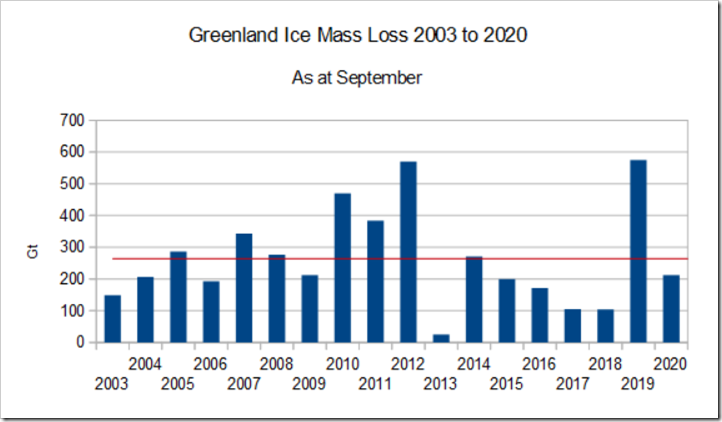Greenland Ice Mass Loss Below Average In 2020

Greenland Ice Mass Change (DMI)
http://polarportal.dk/en/greenland/mass-and-height-change/#c8450
DMI have not yet got around to updating their Greenland ice mass charts for last year, but the data is available from NASA up to October.
The DMI graph is in any event pretty difficult to look at for trends, and has the usual distorted y-axis, which make it look that the ice cap will soon be gone.
Taking the actual data from NASA, derived from GRACE satellite measurements, we can see the year on year changes below, which tell us clearly what has actually been going on:

The warm summers of 2012 and 2019 stick out, but equally there have been cold wet summers, such as 2017 and 2018.
What is evident is that there has been no acceleration in melt since the start of records in 2002. This runs counter to the alarmist message commonly perpetuated, for instance the ever reliable BBC!
The annual average mass loss since 2002 is 264 Gt, but this is a microscopic amount in comparison with the total ice cap mass, which weighs 2.6 million Gt. And as the top graph shows, the sea level rise in the last decades resulting from the melt is only around 10mm.
There is of course no reason we we should at all surprised or alarmed about this melting. We know Greenland is now warmer than in the 19thC, which ice cores prove was the coldest era there since the end of the Ice Age.
We know that temperatures in Greenland now are no higher than the 1920s to 50s. And we also know that glaciers there grew massively between the Middle Ages and the Little Ice Age.
There is no evidence whatsoever that melting will suddenly start to run away. Indeed everything points to it being a natural event, which may well reverse or slow down when the Atlantic Multidecadal Oscillation switches to cold phase and temperatures in Greenland fall sharply, just as they did between the 1960s and 90s.
This article appeared on the Watts Up With That? website at https://wattsupwiththat.com/2021/01/19/greenland-ice-mass-loss-below-average-in-2020/
]]>